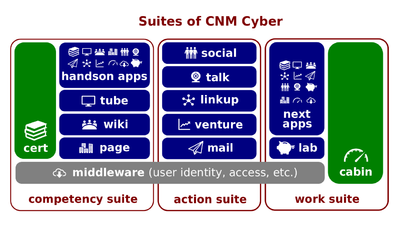Difference between revisions of "Product Work Tests"
| (One intermediate revision by the same user not shown) | |||
| Line 1: | Line 1: | ||
| − | [[File:Cnm-digital.png|400px|thumb|right|[[ | + | [[File:Cnm-digital.png|400px|thumb|right|[[CNMCyber suite]]s]][[Product Work Tests]] (hereinafter, the ''Lectio'') is the [[lectio|lesson part]] of '''[[Manual Testing Essentials]]''' [[lesson]] that introduces its participants to [[manual testing]] concepts. This ''lesson'' belongs to the ''CNMCT Entrance'' section of [[CNMCyber Bootcamps]]. |
Latest revision as of 02:54, 21 October 2023
Product Work Tests (hereinafter, the Lectio) is the lesson part of Manual Testing Essentials lesson that introduces its participants to manual testing concepts. This lesson belongs to the CNMCT Entrance section of CNMCyber Bootcamps.
Content
The predecessor lectio is What Manual Test Is.
Script
- Product work testing evaluates functionality of work products, performance of those teams that developed them, and/or other results of the development.
- With regard to the type of requirements that must have been met, product work testing can be divided in two categories: functional testing and non-functional testing. Functional tests evaluate functionality of work products, while non-functional tests evaluate the performance of the development teams and readiness of the work product to be transferred, installed, launched, and possibly, maintained.
- With regard to the development iterations or phases, functional tests can be further divided in two categories: progression tests and regression tests. Progression testing is undertaken to ensure that newly-developed features are developed properly. Regression testing is undertaken to ensure that newly-developed features do not interfere the proper functioning of the system prior to the recent changes.
- Those user stories that have been used for the last development can be perfectly used for progression testing. Regularly, any acceptance test involves these stories. Vice versa, those user stories that that were used for all the developments prior to the last one can be perfectly used for regression testing.
- Any usage of a work product by any user must be considered as occasional testing as long as this user reports the issues or corrects the bugs.
Key terms
- Product work testing, functional testing, non-functional testing, functional test, non-functional test, product work test, progression test, regression test, progression testing, regression testing
Closing
- Which of the statements below is correct:
- Testing always considers product requirements.
- Regression testing is a type of functional testing.
- Progression testing ensures that newly developed functionalities work as per the product requirements.
- User stories used for the last development can be perfectly used for progression testing
- All of the other substantive answers are correct.
The successor lectio is Verification vs Validation.
